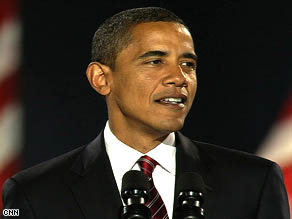
|
"Yes we can." . . . but will we?
|
|
|
Can Obama Really Bring Change?
 I believe the question to be asked and answered in the first six months of Obama's presidency is a simple one: "Will Obama be able to chart a new and more independent course for the nation?" Historically, government and the Congress invariably wind up defining our country's interests in the same sentence as short-term corporate interests. It is extremely rare for anyone in politics other than those on the left to challenge the basic economic and imperial assumptions upon which both domestic and foreign policy have rested on since World War II.
I believe the question to be asked and answered in the first six months of Obama's presidency is a simple one: "Will Obama be able to chart a new and more independent course for the nation?" Historically, government and the Congress invariably wind up defining our country's interests in the same sentence as short-term corporate interests. It is extremely rare for anyone in politics other than those on the left to challenge the basic economic and imperial assumptions upon which both domestic and foreign policy have rested on since World War II.
Today, it can be credibly argued that the political power of the military industrial complex exceeds that of any other competing force in the country. How else can it be explained that a thoroughly incompetent Texas politician named George W. Bush could manage to serve two terms as president, wage an illegal and disasterous war that has done as much material damage to our own country as it has to Iraq, engage in massive illegal spying on his own citizens, eliminate habeus corpus, and authorize billions of dollars in military defense contracts to corporations his administration had direct conflict of interests with?
|
|
This is the political reality that confronts Barack Obama as he prepares to take the oath of office. The business of war is the primary mover in today's economy, so much so that Bush was able to successfully launch a war that was actually -- and obviously to most senior political and military advisors -- against the strategic economic and political interests of the country and was virtually guaranteed to end in disaster while strengthening the hand of Iran in the region.
Despite the fact that our ecomony has finally crashed from years of corporate incompetence, greed, and criminal banking mismanagement, there has been virtually no public discussion of the massive amount of money poured into the military budget each year. On the other hand, the air waves have been filled with politicians warning the people of massive cuts in essential services, health care benefits, and public sector jobs. Could this have anything to do with the fact that many of the same corporations that profit from military spending also own large segements of the mass media? Eisenhower's WarningIn his farewell speech in January of 1961, President Dwight Eisenhower, a Republican, passionately warned the nation:
Change is up to YOU and IIn the councils of government, we must guard against the acquisition of unwarranted influence, whether sought or unsought, by the military-industrial complex. The potential for the disastrous rise of misplaced power exists and will persist. We must never let the weight of this combination endanger our liberties or democratic processes. We should take nothing for granted. Only an alert and knowledgeable citizenry can compel the proper meshing of the huge industrial and military machinery of defense with our peaceful methods and goals, so that security and liberty may prosper together. Another factor in maintaining balance involves the element of time. As we peer into society's future, we -- you and I, and our government -- must avoid the impulse to live only for today, plundering for our own ease and convenience the precious resources of tomorrow. We cannot mortgage the material assets of our grandchildren without risking the loss also of their political and spiritual heritage. We want democracy to survive for all generations to come, not to become the insolvent phantom of tomorrow. Disarmament, with mutual honor and confidence, is a continuing imperative. Together we must learn how to compose differences, not with arms, but with intellect and decent purpose. Because this need is so sharp and apparent, I confess that I lay down my official responsibilities in this field with a definite sense of disappointment. As one who has witnessed the horror and the lingering sadness of war, as one who knows that another war could utterly destroy this civilization which has been so slowly and painfully built over thousands of years, I wish I could say tonight that a lasting peace is in sight.
Who among us can deny that the control of the military industrial complex over government far surpasses anything envisioned by President Eisenhower back in 1961? The coopted and corrupted power brokers in Washington are well intrenched and lie in wait to ambush Obama and make sure that change does not take place. If real and fundamental change is going to come to our country, the driving force is going to have to come from below. It will come from the many millions of people who worked their butts off to get Obama elected. It will come from people like you and I.